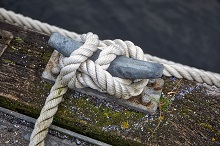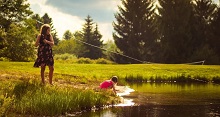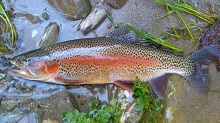The Sea Cucumber Can Help Clean Our Oceans
Canadian Angling.com (Feb. 3, 2011) Scientists are working on a plan that may benefit our oceans by keeping them cleaner by using the Sea Cucumber. One of the challenges of fish farming is what to do with the refuse that is produced and the scientists at Newcastle University (UK) may have come up with an answer; the sea cucumber. The sea cucumbers are marine animals with a leathery skin and an elongated body and are an Asian delicacy. Sea cucumbers are echinoderms—like starfish and sea urchins. The sea cucumber lives primarily on the oceans floor, cleaning up and debris that falls to the bottom. Sea cucumbers feed on tiny particles like algae, minute aquatic animals, or waste materials. They break down these particles into even smaller pieces, which become fodder for bacteria, and thus recycle them back into the ocean ecosystem. Earthworms perform a similar function on land ecosystems.
They are also widely used in Chinese medicine and food (believed to be an aphrodisiac). Sea cucumbers are also a rich source of glucosamine and chondroitin which are used in a range of common food supplements.
Because they are highly sought after, there has been a major drop in their number in the wild but Professor Selina Stead from Newcastle University UK has an idea how to assist in cleaning the refuse from fish farming and to replenish the number of sea cucumbers.
Dr Matthew Slater, (expert in sea cucumbers) and part of Professor Stead’s team, said, “We wanted to find a way to clean up waste produced by large-scale aquaculture so that farming activities in the sea have little or no impact on the ocean floor,” “By growing sea cucumbers on waste from fish farms we are not only farming a valuable food product and giving the wild sea cucumber populations a chance to recover, we are also developing solutions to fish farming impacts.” This project is being presented as part of a marine conference being held at Newcastle University on February 4, 2011.
Professor Tony Clare, Newcastle University’s marine co-ordinator explained: “This new network is about finding solutions to the major challenges facing our marine environment.” “By bringing together world-class scientists from a range of research disciplines, our goal is to find ways in which we can continue to use the seas as a source of food, energy and for transport, but use them responsibly and sustainably so we protect them now and for the future.”
Most of the work has been Newcastle University’s Dove Marine Laboratory. The next step will be to introduce the sea cucumbers to fish farms around the UK. The team is also looking at a project in Tanzania.
Professor Selina Stead, former President of the European Aquaculture Society, said “One of the key aims of the project is to find solutions for developing community-led aquaculture in East Africa as a way of tackling poverty,” she explained. “Sea cucumbers are fairly simple to farm; they just require clean water and plenty of food in the form of nutrient-rich waste. She added that “man’s impact on the sea has escalated in recent decades and it is vital we work quickly to try to reverse some of the problems we have caused. Key species of sea cucumbers are already dangerously close to extinction unless we pull back now and give them a chance to recover.”
Wayne Sheridan



